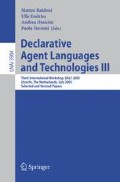Abstract
Multi-agent systems (MAS) can take many forms depending on the characteristics of the agents populating them. Amongst the more demanding properties with respect to the design and implementation of multi-agent system is how these agents may individually reason and communicate about their knowledge and beliefs, with a view to cooperation and collaboration. In this paper, we present a deductive reasoning multi-agent platform using an extension of answer set programming (ASP). We show that it is capable of dealing with the specification and implementation of the system’s architecture, communication and the individual agent’s reasoning capacities. Agents are represented as Ordered Choice Logic Programs (OCLP) as a way of modelling their knowledge and reasoning capacities, with communication between the agents regulated by uni-directional channels transporting information based on their answer sets. In the implementation of our system we combine the extensibility of the JADE framework with the flexibility of the OCT front-end to the Smodels answer set solver. The power of this approach is demonstrated by a multi-agent system reasoning about equilibria of extensive games with perfect information.
Access this chapter
Tax calculation will be finalised at checkout
Purchases are for personal use only
Preview
Unable to display preview. Download preview PDF.
References
Opencyc, http://www.cyc.com.opencyc
Baral, C.: Knowledge Representation, Reasoning and Declarative Problem Solving. Cambridge Press, New York (2003)
Brain, M., De Vos, M.: Implementing OCLP as a front-end for Answer Set Solvers: From Theory to Practice. In: ASP 2003: Answer Set Programming: Advances in Theory and Implementation, Ceur-WS (2003), CEUR-WS.org/Vol-78/asp03-final-brain.ps
Osborne, M.J., Rubinstein, A.: A Course in Game Theory, 3rd edn. The MIT Press, Cambridge (1996)
Jade, http://jade.tilab.com/
Protégé, http://protege.stanford.edu/
De Vos, M.: Implementing Ordered Choice Logic Programming using Answer Set Solvers. In: Seipel, D., Turull-Torres, J.M.a. (eds.) FoIKS 2004. LNCS, vol. 2942, pp. 59–77. Springer, Heidelberg (2004)
De Vos, M., Vermeir, D.: Extending Answer Sets for Logic Programming Agents. Annals of Mathematics and Artifical Intelligence 42, 103–139 (2004); Special Issue on Computational Logic in Multi-Agent Systems
Denecker, M.: What’s in a Model? Epistemological Analysis of Logic Programming (2003), CEUR-WS.org/Vol-78/
De Vos, M., Vermeir, D.: On the Role of Negation in Choice Logic Programs. In: Gelfond, M., Leone, N., Pfeifer, G. (eds.) LPNMR 1999. LNCS (LNAI), vol. 1730, pp. 236–246. Springer, Heidelberg (1999)
Gelfond, M., Lifschitz, V.: The stable model semantics for logic programming. In: Proc. of fifth logic programming symposium, pp. 1070–1080. MIT Press, Cambridge (1988)
Niemelä, I., Simons, P.: Smodels: An implementation of the stable model and well-founded semantics for normal LP. In: Fuhrbach, U., Dix, J., Nerode, A. (eds.) LPNMR 1997. LNCS(LNAI), vol. 1265, pp. 420–429. Springer, Heidelberg (1997)
Eiter, T., Leone, N., Mateis, C., Pfeifer, G., Scarcello, F.: The KR system dlv: Progress report, comparisons and benchmarks. In: Cohn, A.G., Schubert, L., Shapiro, S.C. (eds.) KR 1998: Principles of Knowledge Representation and Reasoning, pp. 406–417. Morgan Kaufmann, San Francisco (1998)
FIPA, http://www.fipa.org/
Wooldridge, M., Jennings, N.R., Kinny, D.: The gaia methodology for agent-oriented analysis and design. Autonomous Agents and Multi-Agent Systems 3, 285–312 (2000)
Dix, J., Eiter, T., Fink, M., Polleres, A., Zhang, Y.: Monitoring Agents using Declarative Planning. In: Günter, A., Kruse, R., Neumann, B. (eds.) KI 2003. LNCS (LNAI), vol. 2821, pp. 345–370. Springer, Heidelberg (2003)
Nogueira, M., Balduccini, M., Gelfond, M., Watson, R., Barry, M.: A A-Prolog Decision Support System for the Space Shuttle. In: Answer Set Programming: Towards Efficient and Scalable Knowledge Represenation and Reasoning. American Association for Artificial Intelligence Press, Stanford, Palo Alto (2001)
Gelfond, M.: Answer set programming and the design of deliberative agents. In: Demoen, B., Lifschitz, V. (eds.) ICLP 2004. LNCS, vol. 3132, pp. 19–26. Springer, Heidelberg (2004)
Leite, J.A., Alferes, J.J., Pereira, L.M.: Minerva - a dynamic logic programming agent architecture. In: Meyer, J.J., Tambe, M. (eds.) Intelligent Agents VIII. LNCS (LNAI), vol. 2002, pp. 141–157. Springer, Heidelberg (2002)
Wooldridge, M.J., Jennings, N.R.: Agent theories, architectures and languages: a survey. In: Wooldridge, M.J., Jennings, N.R. (eds.) ECAI 1994 and ATAL 1994. LNCS (LNAI), vol. 890, pp. 1–39. Springer, Heidelberg (1995)
Costantini, S., Tocchio, A.: A Logic Programming Language for Multi-agent Systems. In: Flesca, S., Greco, S., Leone, N., Ianni, G. (eds.) JELIA 2002. LNCS (LNAI), vol. 2424, p. 1. Springer, Heidelberg (2002)
Kakas, A., Mancarella, P., Sadri, F., Stathis, K., Toni, F.: Declarative agent control. In: Leite, J., Torroni, P. (eds.) 5thWorkshop on Computational Logic inMulti-Agent Systems, CLIMAV (2004)
Jørring, U., Scherlis, W.: Compilers and staging transformations. In: Proceedings of 13th ACM Symposium on Principles of Programming Languages, pp. 86–96. ACM, New York (1986)
Brain, M.J.: Undergraduate dissertation: Incremental answer set programming. Technical Report 2004–05, University of Bath, U.K., Bath (2004)
Ciampolini, A., Torroni, P.: Using abductive logic agents for modeling the judicial evaluation of crimimal evidence. Applied Artificial Intelligence 18, 251–275 (2004)
Author information
Authors and Affiliations
Editor information
Editors and Affiliations
Rights and permissions
Copyright information
© 2006 Springer-Verlag Berlin Heidelberg
About this paper
Cite this paper
De Vos, M., Crick, T., Padget, J., Brain, M., Cliffe, O., Needham, J. (2006). LAIMA: A Multi-agent Platform Using Ordered Choice Logic Programming. In: Baldoni, M., Endriss, U., Omicini, A., Torroni, P. (eds) Declarative Agent Languages and Technologies III. DALT 2005. Lecture Notes in Computer Science(), vol 3904. Springer, Berlin, Heidelberg. https://doi.org/10.1007/11691792_5
Download citation
DOI: https://doi.org/10.1007/11691792_5
Publisher Name: Springer, Berlin, Heidelberg
Print ISBN: 978-3-540-33106-3
Online ISBN: 978-3-540-33107-0
eBook Packages: Computer ScienceComputer Science (R0)

